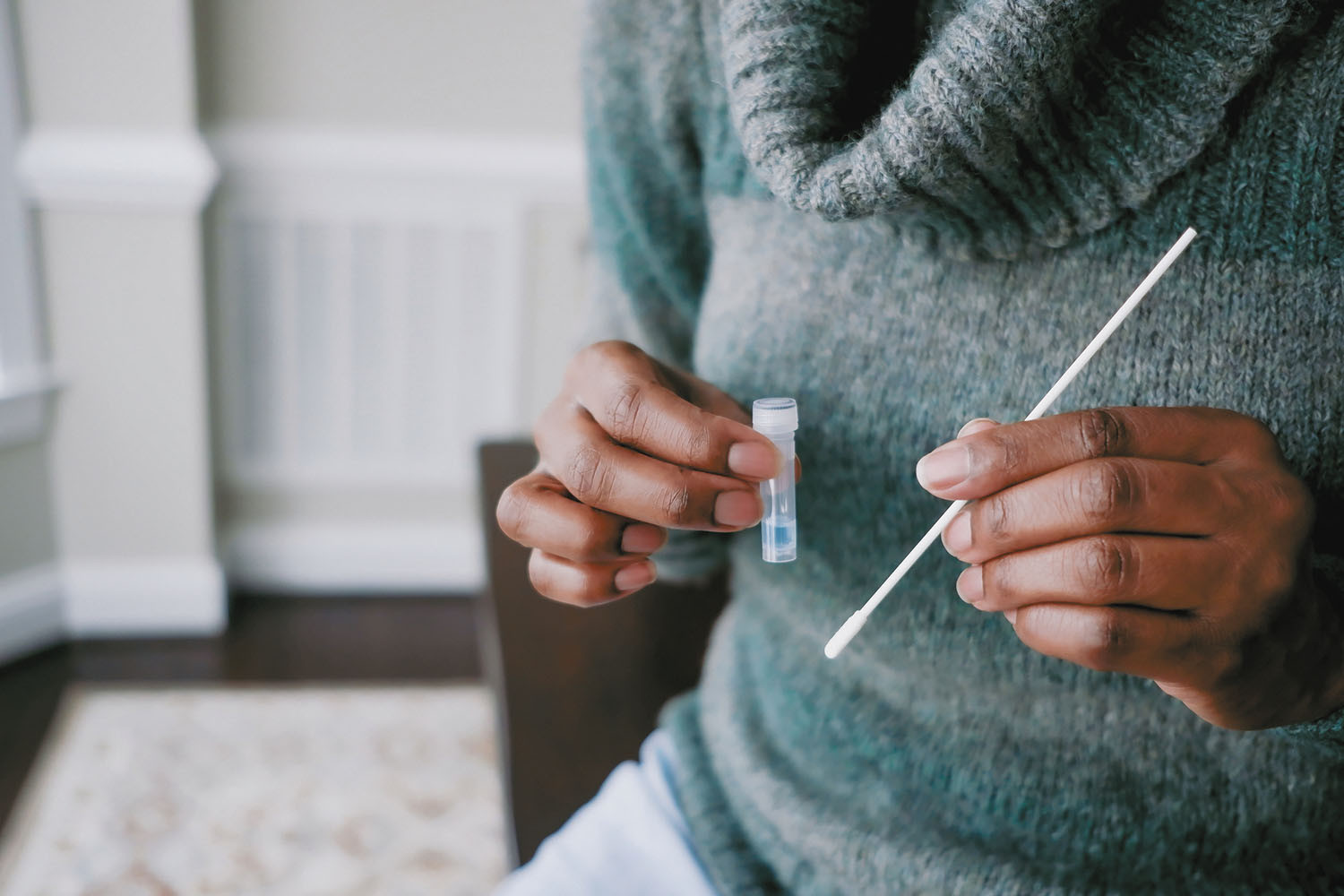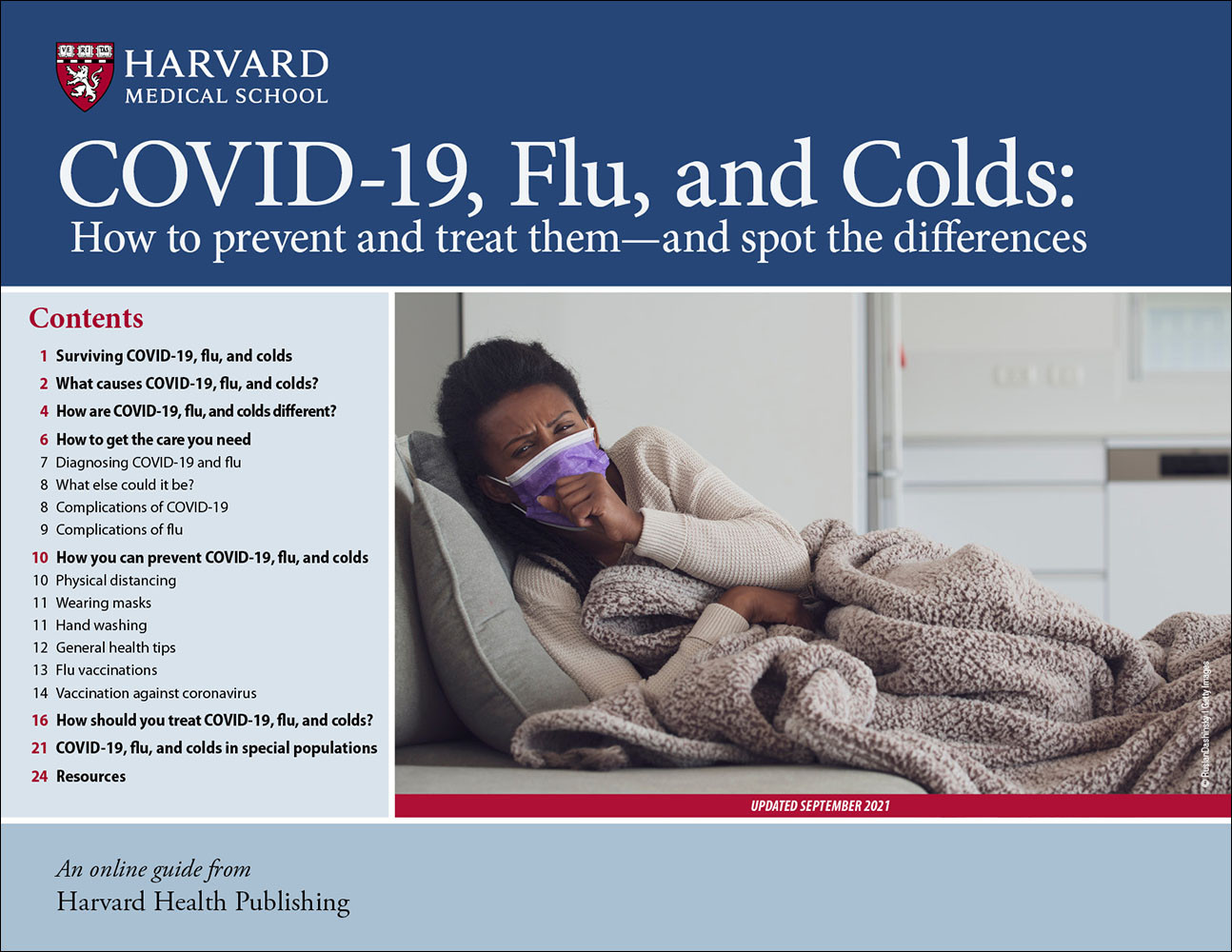At-home tests: Help or hindrance?
Our homes have become mini medical testing labs. But beware of the pitfalls.
- Reviewed by Toni Golen, MD, Editor in Chief, Harvard Women's Health Watch; Editorial Advisory Board Member, Harvard Health Publishing; Contributor

At some point in the past three years, a great many of us stood at our kitchen or bathroom counters swabbing our nostrils or throat and counting the minutes until we learned if we had COVID-19. How did we do that? With at-home medical tests offering rapid results — an innovation that has changed the way we approach our health.
This collective pandemic experience transformed our dwellings into mini medical testing labs. But it also drove home the benefits of being able to check ourselves for conditions that might steer our actions in the short term — say, by isolating to avoid infecting others — or even guide health decisions for years to come.
A new nationally representative poll shows that nearly half of older Americans have used at least one kind of at-home health test. The survey, part of the University of Michigan's National Poll on Healthy Aging, included 2,163 adults ages 50 through 80 who were questioned online or by phone in July 2022.
Rapid COVID tests certainly changed the appetite for at-home testing. But these types of tests have been available for decades, only growing in variety and reliability. Remember urinating on a stick to find out if you were pregnant? Now you can also test your DNA, reveal urinary tract infections (UTIs) or sexually transmitted infections (STIs), predict ovulation, and learn if you're transitioning to menopause. You can measure cholesterol and blood sugar levels, tease out food sensitivities, and hunt for signs of colorectal cancer.
Those are just a few of the dozens of conditions these tests can screen for, diagnose, or monitor. But home-based medical tests also present distinct drawbacks. "I think these tests can be useful, but we have to appreciate their limitations," says Dr. Daniel Sands, a primary care doctor at Harvard-affiliated Beth Israel Deaconess Medical Center. "In human biology, more information isn't always better — unless it's perfect information, and most tests aren't."
Actionable results
It's fairly simple to obtain at-home tests, with various kits available online or in stores. We can buy many over the counter, while a doctor must authorize others. Most involve taking a sample of a bodily fluid — saliva, mucus, blood, or urine — and applying it to kit materials. Some tests provide immediate results, while others must be mailed to a lab.
Convenience is one of the biggest advantages, helping people avoid time-consuming medical appointments. Nearly three-quarters of those surveyed for the National Poll on Healthy Aging said they viewed at-home tests as more convenient than those they take through their doctors.
Some tests — but not all — provide practical information, especially for people who can't access medical care or aren't insured. Ideally, the tests also fuel proactive health care, spurring people to get treated earlier, Dr. Sands says. He points to at-home tests for pregnancy, UTIs, and STIs as particularly worthwhile. "If you're uncomfortable getting tested for an STI, I'd rather you learn this information privately and can then contact your doctor to be treated," he says.
"Knowledge is power, and it's good to have that information, particularly when it's actionable," Dr. Sands adds. "In fact, when we can't see patients face to face, like during the pandemic, home testing can be part of what we recommend to determine what might be going on."
Accuracy concerns
But some at-home tests may only muddy the waters. These include tests that analyze your DNA and answer questions about ancestry, but may also suggest your risks of developing various types of cancer or other life-changing conditions. Genetic tests are popular among Dr. Sands' patients, "leading to interesting conversations about what they mean and what to do with that information," he says. But they can also be fraught with problems.
"You need to understand that just because you're at increased risk for a disease doesn't mean you will get it," he says. "And you also open a whole can of worms when you find out you're at higher risk. It may make you anxious for the rest of your life." Some diseases you might be at risk for may not even have effective screening tests.
At-home test results might also be inaccurate, potentially leading to serious consequences. With an incorrect diagnosis, we may needlessly opt for — or skip — costly or risky treatments such as medication or surgery. A small study of patients taking home-based tests whose results were double-checked in a lab showed four in 10 had gotten false positive results, meaning they didn't have the condition their at-home kit indicated, according to an October 2020 review published in Archives of Pathology and Laboratory Medicine.
"The problem with a false positive is it increases your anxiety level, but it also forces doctors to do additional testing to hunt that result down," Dr. Sands says. "And those additional tests may be more expensive, invasive, or risky."
Some people may be tempted to keep at-home test results private, even at their own peril. Although 92% of older adults from the National Poll on Healthy Aging agreed results should be shared with a doctor, only 55% of those who used these tests for a non-COVID infection shared their results with their primary care physician; that number dropped to fewer than one in 10 of those who used genetic tests.
At-home tests can be expensive, another reason a conversation with your doctor is a smart idea. She can approve tests that are covered by insurers, "so you're better off going to your doctor first," Dr. Sands says.
"People might be embarrassed to let their doctor know they are doing these tests at home, but they don't need to be," he adds. "Call me old-fashioned, but I really believe your primary care doctor should be your trusted health advisor. If you're doing things health-related, like getting a test, you should share that with your doctor."
Make the most of at-home testingWhile at-home medical tests come with explicit instructions, many people still do them wrong — jeopardizing the accuracy of the result, says Dr. Lynne Uhl, director of the Division of Laboratory and Transfusion Medicine at Beth Israel Deaconess Medical Center. "I often wonder, did someone home testing for COVID really swab their nostrils the way they were supposed to, or haphazardly?" she asks. "Similarly, the way they handle their sample may not be as rigorous as needed." The FDA and Dr. Uhl offer these tips to maximize your benefits from these tests: Follow instructions to the letter. This includes reviewing all images to ensure you understand how to take the test properly and interpret the results. Many tests require specific timing and sample amounts. Look for certification. If the test needs to be sent to a laboratory after you collect your sample, check if the lab is certified under the federal Clinical Laboratory Improvement Amendments of 1988 (CLIA). This governmental seal of approval designates high-performing labs that consistently provide reliable and timely results. "If there's no mention of it being a CLIA-certified lab, you should be perfectly comfortable calling the lab or the company that distributes the test kit and asking why," Dr. Uhl advises. When in doubt, call. Similarly, call the test manufacturer if you're unsure how to proceed with taking the test. A toll-free telephone number is typically listed on boxes or instructions. Verify before acting. Don't change your medications or dosages based on the results of a home test without talking to your doctor first. Follow up when needed. If any symptoms that prompted you to take a home test don't get better, call your doctor. Do the same if your results are troubling or don't seem to make sense. |
Image: © Grace Cary/Getty Images
About the Author

Maureen Salamon, Executive Editor, Harvard Women's Health Watch
About the Reviewer

Toni Golen, MD, Editor in Chief, Harvard Women's Health Watch; Editorial Advisory Board Member, Harvard Health Publishing; Contributor
Disclaimer:
As a service to our readers, Harvard Health Publishing provides access to our library of archived content. Please note the date of last review or update on all articles.
No content on this site, regardless of date, should ever be used as a substitute for direct medical advice from your doctor or other qualified clinician.
















